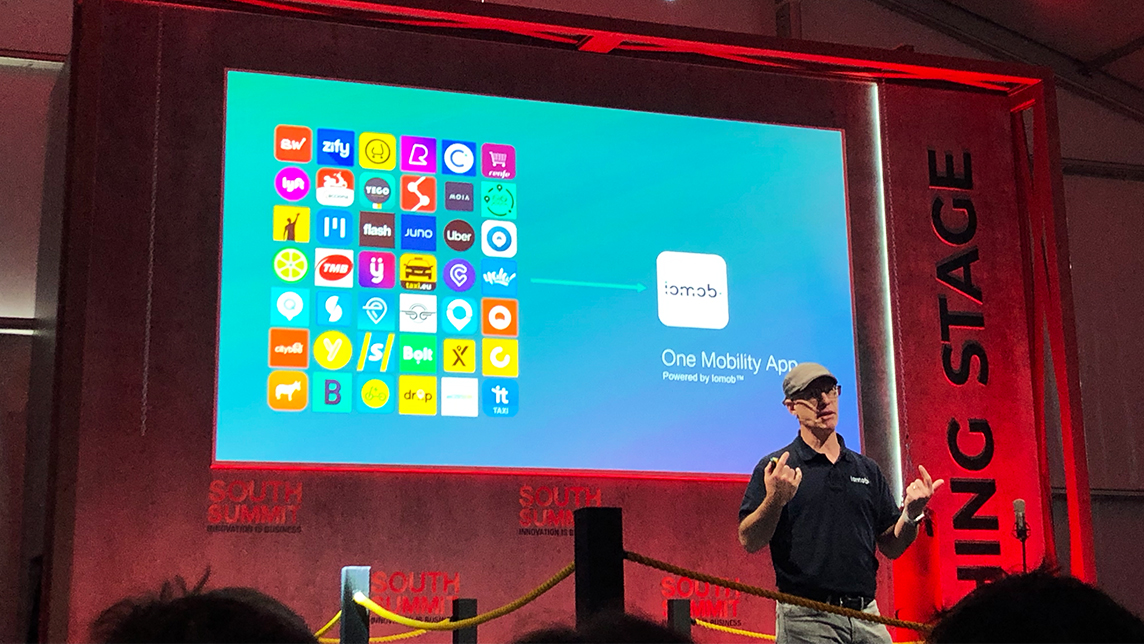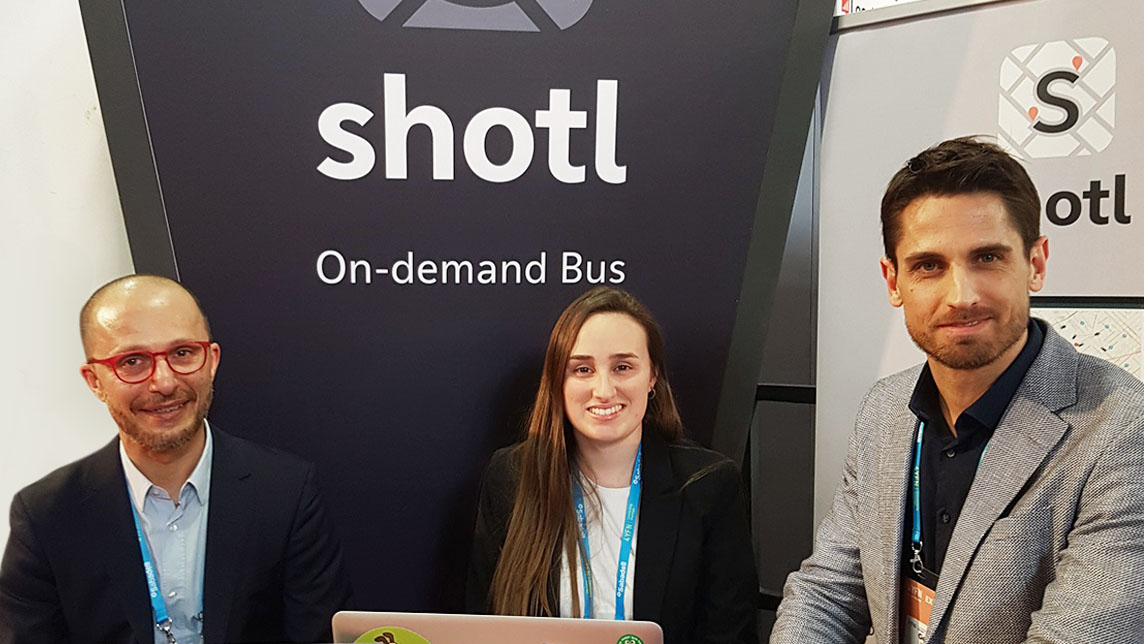In Barcelona, an ambitious startup is developing an open-source platform to unify mobility providers around the world. MaaS (mobility as a service) platforms like Iomob, short for Internet of Mobility, want to help eliminate 2.3bn private trips by 2023, with 83% of the world's MaaS trips taking place in Western Europe. Key players like Uber and Lyft have already opened up their APIs to share transit information and allow payments through third-party apps.
Technology is paving the way to optimize usage of transport infrastructure and reduce vehicle emissions by cutting the number of private journeys. Although sustainability is a key priority, convenience and cost will also be critical factors to determine which players will survive and scale up in the industry. There are more than 1,000 mobility startups worldwide. Only a handful have been installed and used by consumers. The smart mobility ecosystem is very competitive with private and public providers fighting for market share.
At South Summit 2019 in Madrid, CompassList interviewed Iomob CEO Boyd Cohen about his vision of the cities of tomorrow. As its mission, the two-year-old mobility startup wants to decentralize MaaS services to allow the open mobility ecosystem to flourish.
This interview has been edited for length and clarity.
Q: Tell us about Iomob and your team.
Boyd Cohen: Co-founder and CTO Josep Sanjuas has a PhD in Computer Science and founded Talaia in 2013. The SaaS company was sold to a Canadian network management software provider in 2018. Talaia's first employee Victor López joined us as the third co-founder and director of software engineering. He is a PhD candidate at the Supercomputing Center in Barcelona. Our current team of nine will be increased as we recruit more specialists in software, back-end engineering, app development, UX and design.
What problems are you looking to solve and how does Iomob do so?
The challenge that smart mobility is currently facing is the fragmentation of services, such as bike sharing, ride-hailing companies, taxis, e-scooters and so on. The explosion of smart mobility services across cities around the world is great, but each one of those has its own independent mobile app.
An ideal mobility ecosystem would enable users to access all these services without the need of downloading every single app. MaaS is about creating seamless integrations and access to private and public mobility services.
Iomob is the next generation of MaaS platforms. We adopt a deep-tech approach to MaaS solutions by developing a proprietary algorithm that allows consumers to find the most optimal combination of mobility services to move from A to B. Our open-source model is very unusual in the industry. Any mobility service, even a startup that doesn’t have its own app or money to promote its services, can plug its vehicles into our app and get the exposure needed.
What is the business model and source of income for Iomob?
We have three revenue streams. One is through SaaS subscriptions. We also earn fees as a percentage of transactions between users and mobility providers. The third one is from the data marketplace. Once we have scaled our operations in a sufficient number of cities, we'll gather a great amount of rich data that can be re-used and monetized.
You have three pilots: with [national rail operator] Renfe in Spain, Ford Motor in Pittsburg and the Smart Mobility Challenge in Sweden. Have you monetized through these pilots?
Yes, all were paid pilots. I believe that there's a lot of abuse of startups right now. Big companies and organizations want to have access to pilots with startups but don’t want to pay for it. I think this is ridiculous. Startups are struggling and can barely afford to pay the bills. Founders sacrifice everything while multibillion-dollar companies expect them to work for free. Startups are even willing to lose money on a pilot, but not paying for the work they do is unethical. We don’t do this kind of project.
Are you operating in other cities in the future? Any plans to collaborate with the city of Barcelona or other cities in Spain?
Our project with Renfe includes Madrid and Barcelona. The vision is to expand throughout Spain. Renfe is a public company so there's going to be a public tender process that we need to go through. If we win, we'll be expanding to every city in Spain. Right now, we consider ourselves Pan-European first and therefore we focus on Europe, but we also have projects in New Zealand and Australia.
We're looking at Asia very seriously. Our sales VP is from Singapore and she’s looking at these markets. We're currently having interesting conversations with big clients in Asia. If a good opportunity arises, we’ll take it. But we'll actively go after Asian clients probably in late 2020.
Who are your investors and how much have you raised to date? Are you planning for new funding rounds? Have you considered an ICO?
At the very beginning, Iomob was bootstrapped. We're also going to launch an ICO as we were very blockchain-centered at the beginning, but then the ICO market crashed.
In 2018, we raised a pre-seed round of about €620,000 form BlockAsset in Singapore, Centrality in New Zealand and some minor blockchain investors. We´ve recently completed the TechStart acceleration program in Amsterdam and received US$100,000 in convertible note. Our pre-seed investor Centrality has also put in extra money in convertible note. We're now actively looking to raise a new funding of over €1m.
Have you applied for any public grants? And if so, have you received sufficient support from public institutions? In your opinion how efficient is the system in Spain compared to the rest of Europe?
We applied for an EU fund for SMEs but we didn’t get it. There's a lot of public funding in Europe, more than in the US, a lot of government funds and programs focused on innovation. I think the problem for startups is the application process that is just too annoying, too much paperwork and bureaucracy. Once the proposal is submitted, startups have to wait for months before getting a response. In case of a positive response, there are many more rounds to go through. We're building a company and we've got to move fast. The timeframe and accessibility to funding, it's not as viable as it should be. This happens with any government funding, very few move fast.
Spain is very proactive in promoting smart cities. There's the Spanish network of smart cities RECI which includes 55 cities, which is crazy for a fairly small country. Barcelona is a pioneer in smart cities. In November every year, it's been hosting the Smart Cities World Expo, one of the largest and most important events for the tech ecosystem.
What milestones do you plan to achieve in 2020 in terms of revenue growth?
We are certainly expecting to reach total revenue of over €1m. We want to secure at least three commercial projects since our pilots have now been completed. We want to raise enough money to allow us to focus on execution and have a big enough team to deal with all the incoming projects. Right now, we don’t have enough resources to do more.
Five years from now, where do you see Iomob?
We want to be a unicorn. For Iomob, being a unicorn means becoming a global platform for the MaaS industry, powering hundreds of apps connected to our back-end technology.
Our vision is that any mobility device, anywhere in the world, can be connected to our back-end protocol. Once it’s connected, it can be accessible to any app connected to our back-end. This is something very powerful for Iomob´s architecture, the global roaming. Global roaming means that if you have an app like the Singapore Airlines app and you are flying from Singapore to Madrid, you'll get access to any mobility service in the Madrid area. Every service that's connected to our platform, using just one single app. In five years, we'll be a unicorn because we have managed to reach this point, or we'll be well on our way to achieve it.
What technology do you deploy that's making a difference? Have you considered integrating EV services?
This is something we’ve been asked a lot by some of our clients and organizations that are looking to embrace EVs in their ecosystems. So yes, we'll be incorporating that into our algorithms, it's already on our roadmap.
Our proprietary multimodal routing algorithm can combine multiple mobility services to offer different options to users. Our back-end technology, called the Hub, allows seamless connectivity to each different mobility service that's connected to Iomob platform. Once integrated, we know the exact and real-time location of every vehicle in the city so that our algorithm can provide users with a range of mobility options.
Our front-end technology is an app for the end user. It's white label and is offered to B2B and B2G customers like Renfe, airlines and government authorities. The app includes four main features. The first is for users to discover vehicles around them, this is the Hub.
The second is the multimodal routing, where users get to choose between different forms of transport [based on their preferences] such as the cheapest, the fastest, the greenest or the most optimal one that combines all three criteria. The last two are for booking and unlocking vehicles. Users can pay for the services using the same app, so they don't have to download any other app to use the services.
How is blockchain technology integrated into the platform?
We founded four blockchain companies. But as we started engaging with the smart mobility ecosystem, we realized that [players] are not ready for the ideas we had, we're too disruptive and blockchain was still too new.
We haven’t integrated any blockchain into our app, but we have embraced some elements of the blockchain philosophy. We grant open access to our system which is “permissions-less,” a very common term in blockchain. It means nobody has the authority to control users´ access to a given ecosystem. Iomob has embraced this idea. In a few months, we'll be opening an API that'll allow innovative mobility startups to freely plug into our system.
Something really cool about our model is that if a service is the best option for a certain user, our algorithm will show it, even if the company has a fleet of only 10 vehicles. In this way, we promote decentralization and democratization. In an open network, anyone with a legal mobility service should be discoverable and that´s the core element of our philosophy.
To what extent do you think EU regulation is limiting the sector's growth?
I think Europe is doing very well, probably better than any other market right now. The MaaS Alliance, based in Europe, promotes better regulations and collaborations in the ecosystem. Some pioneering countries like Finland, for example, have recently passed a law that requires private operators to open their APIs so that other companies like us can integrate their services.











